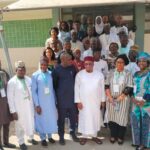NSF: Edo bags 18 medals as weightlifters, kung fu fighters shine
By Usman Aliyu Team Edo has kicked off its campaign at the ongoing 2024 National Sports Festival (NSF) in Ogun with an impressive medal haul, already securing 18 medals in the first three days of the competition. The state’s athletes delivered a remarkable performance across key sports, particularly in weightliftingContinue Reading





















